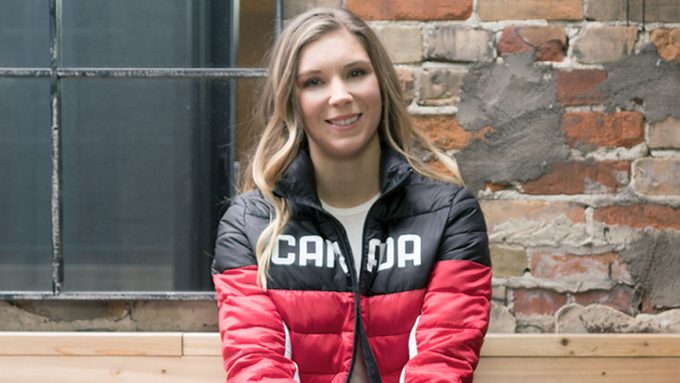Dara Howell Opens Up About Her Fear Of Failure, And How She Keeps Skiing #LikeAGirl
Olympic skier Dara Howell may have won gold at Sochi 2014, but the pressure of being at the forefront of her sport took her on a journey she’ll never forget.

Fear can be paralyzing, but Howell has learned how to conquer it head on
Failure. This is a word you often don’t think of when you hear “Olympic gold medalist,” but for Dara Howell who won gold at the Sochi 2014 Olympics, it was something she needed to overcome. It was her #BHmoment.
“My aha health moment came last season when I took some time away from competing and being at the forefront of my sport to get my confidence back,” says Howell.
After winning gold at the Olympics and feeling as though she had achieved the top of her sport at the age of 19, she feared there was nothing more to accomplish. “Instead of focusing on ‘what’s next?’ I had to find the fun in competing and the passion for my sport again,” she says. “Although I didn’t finish at the top last season, I am proud that I pushed myself and worked hard to overcome my fear of failure and my drop in confidence.”
Why it was important that she triumph over her fear
“It was important for me to go through this experience because having those fears and having to deal with the pressure, I learned how to change my thinking and use my fear of failure as fuel to grow and rebuild to where I am now.”
How she got her confidence back
“I took some time away from the spotlight and went home to Huntsville,” she says. “For a while, I mostly spent time with family, processing everything that had happened in Sochi and the subsequent attention. Then I started seeing a sports psychologist and got a couple of new coaches. After being able to reset, things turned around pretty quickly. By surrounding myself with positive figures in my life and mentally pushing myself beyond my fear of failure, I was able to fall in love with slopestyle all over again.”
Would she have done anything differently?
“After going through some challenges after my win, I learned that I’m good at my sport and I deserve to be out there just as much as my teammates and competitors,” she says. “Sochi wasn’t a fluke, and even though slopestyle comes naturally to me, I’ve been training harder this season than ever before. I keep pushing myself to give it another try and if I don’t succeed, then at least I know I’ve given it every ounce of sweat and tears and effort to be had. I don’t think I would do anything differently because I wouldn’t be the person I am now. I’m much better equipped to handle failure and I’m more driven and focused going into Pyeongchang than I’ve ever been.”
Fueling your body properly after a workout is important — here’s what you should eat.
What she wants young girls to learn from her journey
“I want others to know that it’s OK to make mistakes, it’s natural to fail. It’s how you learn! You don’t have to be perfect,” she says. “Once you realize that, then you feel empowered to learn from your mistakes and failures and setbacks and to grow from them.”
And this is what lead her to recently partner with Always and the #LikeAGirl campaign. “I want young girls to embrace failure to help boost their confidence,” she says. “I couldn’t believe that half of Canadian girls are paralyzed by the fear of failure at puberty, meaning that many don’t try new things and miss out on opportunities! To me, that’s unacceptable and I feel fortunate to be in a position where I can show girls that you don’t need to be perfect every time, and it’s OK to be scared as long as you don’t give up.”
Her final piece of advice
“Don’t let fear of failure stop you from being the best you can be. Try, fail, learn and keep going.”
Wondering how fit you are? Try taking our “How Fit Am I?” Fit Test.




